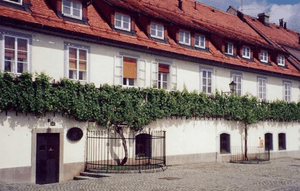Žametovka

Žametovka (also known as Ametovka and Kavčina črna) is a red Slovenian wine grape variety. This is one of the oldest domesticated grape varieties in Slovenian. Formerly it was popular in Styrian vineyards, and even more so, even today, known in Dolenjska in southeast Slovenia - from the reddish wine cviček. It produces a wine of pure red color. A single vine of Žametovka growing in the Slovenian town of Maribor is estimated by the Guinness Book of Records to be the oldest living vine still producing fruit in the world at over 400 years of age.[1][2][3][4][5]
Maribor vine
The vine growing in Maribor is part of the frontage of Old Vine House (Hiša stare trte) located in the Lent neighborhood along the Drava river. Paintings of the house kept at the Štajerska Provincial Museum in Graz show the vine growing at least as early as 1657. In 1972,[4] the vine was tested by a Paris laboratory with its age confirmed to be over 400 years.[3] During its life, the Maribor vine survived the Ottoman–Habsburg wars that affected the entire region, Napoleon's invasion and rule of the Illyrian Provinces, the phylloxera epidemic that devastated Vitis vinifera vines across the continent as well as World War I and World War II.[6]

Each vintage the Maribor vine produces enough fruit to make around 25 liters of wine that gets bottled in small 250ml bottles and given by the city council of Maribor as ceremonial gifts to dignitaries[1] with former United States president Bill Clinton being the recipient of one such bottle.[7] Pope Benedict XVI, Emperor Akihito of Japan and former California governor Arnold Schwarzenegger have also received bottles of Žametovka wine produced from the Maribor vine.[6]
Cuttings from the vine are also given as gifts with King Abdullah II of Jordan being the recipient of one cutting and former Slovenian President Milan Kučan having another cutting growing at his home in Ljubljana.[4][7]
Harvesting of the vine and crushing of the grapes takes place at the end of September as part of a 10-day Bacchanalia festival in Maribor.[2][6]
Wine
Žametovka is a late variety (ripens in middle of October), moderate vigor, requires a better vineyard location. It is relatively resistant to winter frost, but less against the spring frost. Since the beginning of budding to full maturity of the grapes takes about 170 days. The cluster is large, medium compact and weighs an average of 250-400 g. Žametovka grapes tend to ripen to high sugar levels and to produce rich wines with noticeable sweetness and residual sugars.[1] The wine made from the Maribor vine, which is not available for public sale, has been described by the The Daily Telegraph as "virtually undrinkable".[2]
Synonyms
Over the years Žametovka has been known under a variety of synonyms including Kavcina Crna, Kapcina Kavtchina, Koelner blau, Koelner Blauer, Zametasta Crnina, Zametna Crnina and Zametnina Crnina.[8]
See also
- Versoaln, white Italian grape with a 350+ year vine still used for wine production
References
- 1 2 3 G. Harding "A Wine Miscellany" pg 19, Clarkson Potter Publishing, New York 2005 ISBN 0307346358
- 1 2 3 Anthony Gardner "Maribor, Slovenia: a cultural city guide" The Daily Telegraph March 1st, 2012
- 1 2 Nick Stephens "The Oldest Grape Vine in the World – and The Oldest Wine etc!" Bordeaux Undiscovered. July 17th, 2008
- 1 2 3 Slovenian Press Agency "Maribor Harvests World's Oldest Vine" September 25th, 2011
- ↑ Patricia X. Savoie "Slovenia, Little Country-Big Wines" Wine Business Monthly December 2002 issue. Accessed: November 3rd, 2012
- 1 2 3 Seth Sherwood "Castles and high-tech culture in Slovenia" The Seattle Times August 7th, 2011
- 1 2 Ksenija Samardzija "An ancient grape vine in Slovenia is spreading good vibes across border..." Radio Prague. September 26th, 2003
- ↑ Vitis International Variety Catalogue (VIVC) Žametovka Accessed: November 3rd, 2012